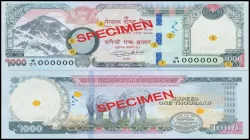Nepal President's economic advisor resigns after criticising inclusion of Indian territories in Rs 100 note
Chiranjivi Nepal, the economic advisor to President Ram Chandra Paudel, termed the decision to include Indian territories in the map on Nepali Rs 100 notes as "inappropriate". Former PM KP Sharma Oli, under whose regime Nepal had first published the controversial map, slammed Chiranjivi's remarks.

Kathmandu: Nepal President Ram Chandra Paudel's economic advisor, Chiranjivi Nepal, has resigned after his controversial remarks criticising the government's decision to print a new Rs 100 note that includes Indian territories Kalapani, Lipulekh and Limpiyadhura, a move rejected by India. Chiranjivi had reportedly termed the decision of printing the new map as "inappropriate".
The President approved Chiranjivi Nepal's resignation on Sunday, according to the press release issued by the Office of the President. He was the former governor of the country's central bank. A Cabinet meeting last week decided to replace the old map with the new one while printing new notes of Rs 100, including the Indian territories of Kalapani, Lipulekh and Limpiyadhura.
CPN-UML chairman and former Prime Minister KP Sharma Oli had publicly criticised Chiranjivi for his remarks. "I have raised this serious issue to draw the public attention as it might cause practical problems to the people," Chiranjivi mentioned in his resignation letter, an aide to the president told news agency PTI on condition of anonymity.
Civil society leaders demanded Chiranjivi's removal
“I have tendered my resignation from the post to maintain the dignity of the honourable President, as attempts were made to unnecessarily drag the president into controversy citing my statement,” the advisor said. This came after a group of civil society leaders had demanded the removal of Chiranjivi Nepal over his remarks against the government's decision to print new hundred-rupee notes with the map of Nepal as per the amended Constitution.
They argued that he had gone against national interest and breached decorum while speaking to the national and international media on the matter. Nepal's government unveiled its new political map with the inclusion of Lipulek, Kalapani and Limpiyadhura areas within its territory in May 2020 during the government led by Oli and was later endorsed by the Parliament unanimously despite objections from India.
India's response to Nepal's new currency notes
On the recent decision of the Nepal government to introduce a new Rs. 100 currency note featuring a map including Indian territories, India’s External Affairs Minister S Jaishankar has reacted saying that New Delhi's position is very clear, adding that Kathmandu unilaterally took some measures on their side.
"With Nepal, we were having discussions about our boundary matters through an established platform. And then in the middle of that, they unilaterally took some measures on their side. But by doing something on their side, they are not going to change the situation between us or the reality on the ground," said Jaishankar while interacting with professionals in Odisha’s Bhubaneswar on his book 'Why Bharat Matters'.
Tensions had soared between India and the land-locked Himalayan nation after the latter issued a political map in mid-May 2020, including the Lipulekh, Kalapani and Limpiyadhura, which India earlier had included in its November 2019 map. The earlier map issued by Nepal in 2032 BS (1975) left Gunji, Nabhi and Kuri villages, which have now been included in the recently revised map, adding 335 square kilometres of land.
Nepal shares a border of over 1,850 km with five Indian states – Sikkim, West Bengal, Bihar, Uttar Pradesh and Uttarakhand. The issue remained under control until India published a revised political map showing the newly created Union Territories of Jammu and Kashmir and Ladakh in 2019. At that time, India showed Kalapani as part of the Pithoragarh district. This prompted Nepal to exhibit strong protests against New Delhi.
(with inputs from PTI)
ALSO READ | Jaishankar on Nepali notes featuring Indian territory: 'Unilateral measures will not change ground reality'